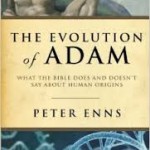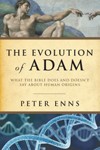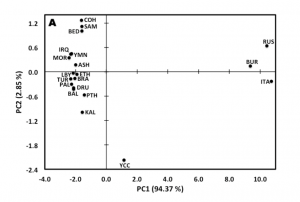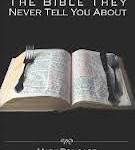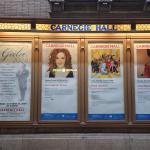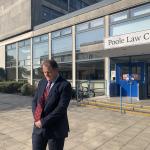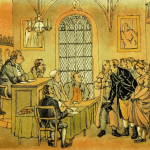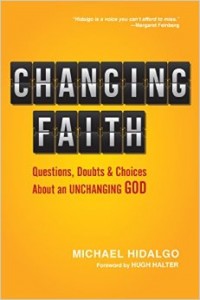 Today’s post is an interview with Michael Hidalgo, whose Changing Faith: Questions, Doubts and Choices About the Unchanging God comes out this month! Michael and his wife have lived in downtown Denver the past 8 years and have three magnificent, imaginative, hilarious, wonderful children. He currently serves as the lead pastor of Denver Community Church.
Today’s post is an interview with Michael Hidalgo, whose Changing Faith: Questions, Doubts and Choices About the Unchanging God comes out this month! Michael and his wife have lived in downtown Denver the past 8 years and have three magnificent, imaginative, hilarious, wonderful children. He currently serves as the lead pastor of Denver Community Church.
Tell us a little bit about yourself and your spiritual journey.
I grew up in the Church my whole life. I tried to run from it, but as far as I got I was always drawn to the simple grace of Jesus. After college I met a pastor who was loving and kind. He helped reorient my faith and, in many ways, my life.
And so I thought, I bet I could do this for at least one person. I threw myself headlong into seminary, speaking, working at a church . . . the whole bit. My heart grew far to simply help people take a next step in their faith.
My work as a pastor led me to the great city of Denver. It is here I have met so many who come from all over the country from different faith traditions who ask thoughtful questions in a desire to know God. Many of these conversations over the years inspired me to write Changing Faith.
Why did you write this book?
More people than ever before have deep questions, doubts, and skepticism about God and the Christian faith. These are not people who reject faith in God, but those who desire a more robust faith than ever. This book is a reflection on many of the conversations I have had with such people.
The bigger vision behind the book is really about hope. I am hopeful about our future because I believe the Bible, the Church and the life of Jesus are still good news. I say, “still good news” because many no longer see these things as Good News.
They have questions about how the Bible fits with recent discoveries in science or struggle to understand why the Church seems narrow or are confused about why Christians and Jesus seem to be two different things. These new questions are given the same old answers. So I wrote the book to engage with those who have doubts and questions – not to give a new final answer but to consider what our next best steps should be.
I wrote this book for people who have a deep desire to be faithful, but do not hold to the same faith as previous generations. By reading Changing Faith I hope they will be given a direction in the midst of our changing world – more of a compass and less of a roadmap.
Give us a brief flyover of the book and a few quotes that help us really capture what it’s about.
I invite the reader to look through multiple lenses. This does not mean doing away with all they have ever believed, but allowing their faith to grow and expand. Each chapter explores different questions. Questions like:
How certain can we be about our beliefs? Will our theology ever be enough for us and how can we be sure it is true? How authoritative is the Bible and does my experience matter? What about all the things we do not and cannot know – what does our “unknowing” have to teach us? Can we ever really, truly know we are right, and if so is that the point of our faith?
The book that moves toward what kind of life should we live in our changing world.
I included a discussion guide in the back of the book because my hope is people will not read this book on their own but with friends, families, small groups or wherever your find community. The idea being, when each chapter ends, the real conversation begins.
Here are a few quotes that I think help capture the book,
“Humanity has always observed new things, which has led to new understanding about the earth, the Bible, science, God, the human body and the church. Our new understanding has reformed and reshaped our beliefs about what is wrong and right. This does not necessarily mean everything is changing, only our ability to understand it . . . And when our understanding changes, our faith changes too.” (“From Being Right To Being Faithful,” Chapter 5)
“Many of us are willing, able and eager to speak about Jesus, but we often miss the starting point. While we believe the answer is Jesus, we’re unaware of the questions people are asking. Chances are we give answers to questions no one is asking. And there is nothing more boring than an answer to a question that hasn’t been asked.” (“From Bad News to Good News,” Chapter 11)
What are a few parts of the book you particularly excited about?
First, how the book speaks about science and faith – not as competing but as complimentary. The more we know about science the more we are able to allow the Bible be what it is as an ancient, Eastern book filled with beauty and poetry and stories of God’s eternal conversation with humanity. What I have found is the more we look deeply into both science and spirituality the more we are filled with a childlike awe and wonder. And that’s what I am interested in – wonder.
I am also inspired by the people I speak about in the book. Many who have gone before me, led me and encouraged me to navigate the doubts I have had and still have. These are courageous people who continually invite me into new territory with regard to my faith.

